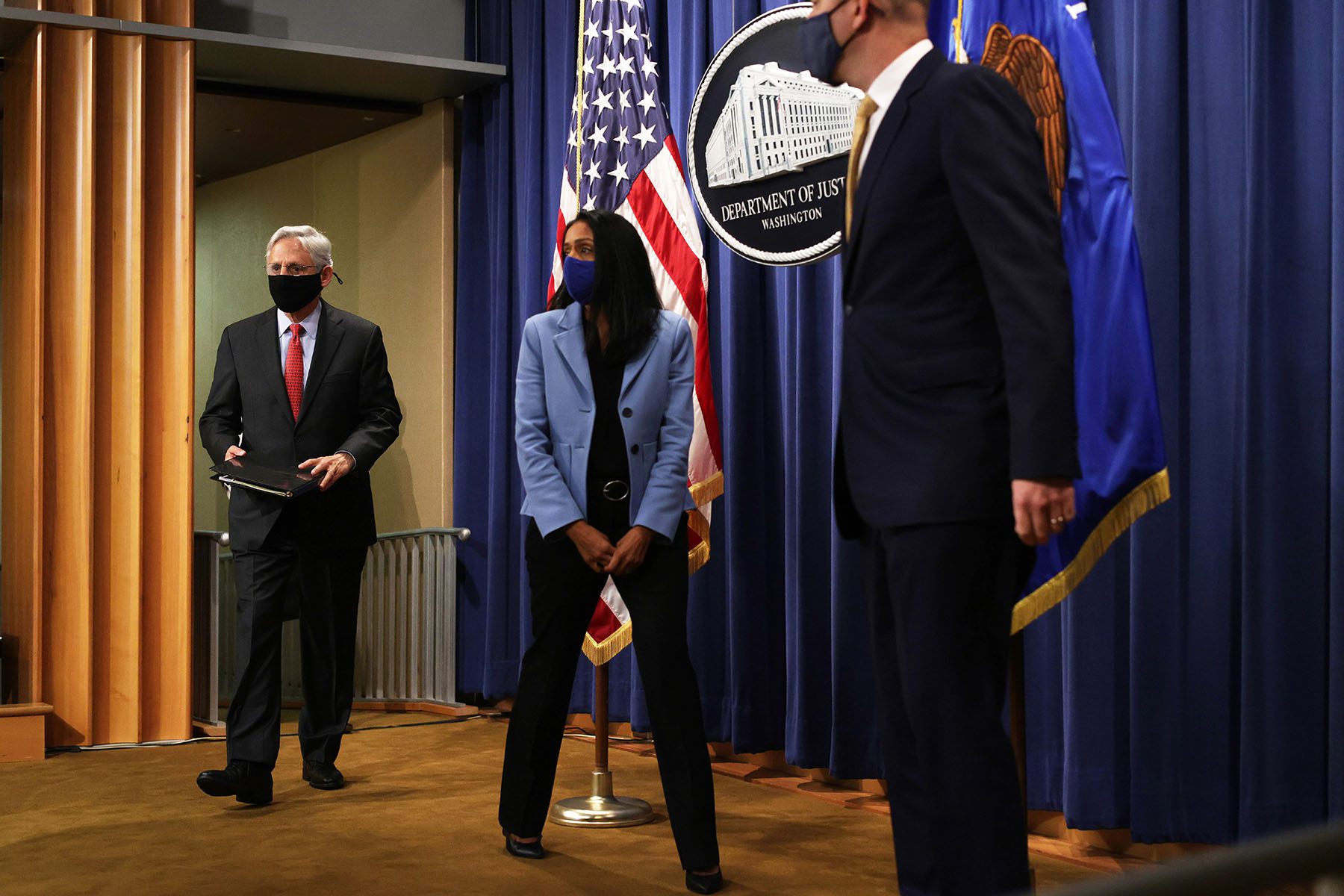The Department of Justice is seeking to block Texas’ six-week abortion ban — the most restrictive active abortion law in the country — which has been in effect for two weeks. The request came in a court filing Tuesday night, part of the case known as United States v. Texas.
Attorney General Merrick Garland announced last week that the DOJ had filed suit against Texas over its law, Senate Bill 8, which he called “clearly unconstitutional under long-standing Supreme Court precedent.”
Previous Supreme Court rulings — 1973’s Roe v. Wade and 1992’s Planned Parenthood v. Casey — have held that the Constitution guarantees the right to an abortion up until a fetus can independently live outside the womb. Texas’ law bans the procedure not only before viability but also before many people even know they are pregnant.
What will the DOJ’s request mean for abortion access in Texas? The 19th reached out to legal experts to learn more.
What happens now?
The DOJ has requested either a temporary restraining order or a preliminary injunction that would temporarily block the law as legal arguments proceed.
“This relief is necessary to protect the constitutional rights of women in Texas and the sovereign interest of the United States in ensuring that its States respect the terms of the national compact,” the filing reads. “It is also necessary to protect federal agencies, employees, and contractors whose lawful actions S.B. 8 purports to prohibit.”
The DOJ is making its argument before the federal court for the Western District of Texas. The judge handling the case has slated arguments for October 1.
That means the law will have been in effect for at least a full month. Even if it is blocked, the impact will be significant.
“It may be a permanent loss of the number of clinics that are available,” said Carol Sanger, a professor at Columbia Law School who studies abortion law.
Already, clinics are scaling back services as a result of SB 8. Some are no longer providing any abortions whatsoever. Fear of legal action means that some doctors who previously provided abortions in Texas also have stopped — even abortions before six weeks of pregnancy.
“The law is in effect. It has essentially shuttered abortion providers in Texas,” said Melissa Murray, a law professor at New York University who studies reproductive policy. “If you are a pregnant person seeking an abortion in Texas right now, that’s dead on arrival.”
What argument is the DOJ making? Is it likely to succeed?
SB 8 is different from previous bans. Rather than criminalizing the procedure, the law empowers private citizens to sue anyone who may have helped another person get an abortion after six weeks.
That structure has made the law harder to challenge in court. When asked to intervene in a previous lawsuit over the ban brought by abortion providers in the state — Whole Woman’s Health v. Jackson — the Supreme Court’s conservative majority did not address whether the Texas ban is constitutional. Instead, the five justices cited the unusual punishment scheme in its decision not to block the law.
But the DOJ could have more luck. It is making a distinct, new argument in its case. The lawsuit argues that Texas’ law interferes with the United States government’s ability to effectively govern the nation and protect the rights guaranteed under the U.S. Constitution.
It targets both the law’s specific ban on abortion and the lawsuit component of SB 8, arguing that neither is constitutional.
“Texas devised an unprecedented scheme that seeks to deny women and providers the ability to challenge S.B. 8 in federal court. This attempt to shield a plainly unconstitutional law from review cannot stand,” the DOJ’s brief reads.
An injunction, it adds, is necessary “to protect the constitutional rights of women in Texas and the sovereign interest of the United States in ensuring that its States respect the terms of the national compact.”
Because United States v. Texas is making a separate argument from the Whole Woman’s Health case, the DOJ could succeed in winning an injunction, even when the clinics did not.
“Whether they have a better chance has to do with whether they have better arguments,” Sanger said. “They’re saying what’s at stake is the United States defending the Constitution.”
What would an injunction do?
If the DOJ’s request is granted, either a preliminary injunction or temporary restraining order would effectively halt SB 8 while the law is being challenged in court. Lawsuits could not be filed under its civil enforcement provision, and abortion providers could legally perform the procedure at or after six weeks pregnancy.
That could allow the vast majority of abortions to resume in Texas. But it wouldn’t be the end of the case.
If the district court grants an injunction, Texas has the right to appeal to the next level – the U.S. Court of Appeals for the 5th Circuit. That court is considered one of the most conservative appeals courts in the country.
The appeals court has the power to block any injunction if it finds fault with the district court’s reasoning. If that happened, it could create a ping-pong effect — where the Texas ban ricochets between being in place and not.
“You could see this sort of oscillating, ‘We’re open! We’re closed!’ And that doesn’t help either,” Murray said. “There are so many women in Texas who wonder if they have this right. That could further complicate things.”
After the 5th Circuit, the next remaining avenue for appeal would be the U.S. Supreme Court. But it’s hard to know if or when that court would hear such an appeal, or whether the nation’s abortion laws the DOJ is trying to safeguard will have changed before then.
How does the Texas lawsuit factor in with other abortion cases?
The Supreme Court is scheduled to hear a different abortion case — Dobbs v. Jackson Women’s Health — this coming term. In that case, the court will hear oral arguments regarding a Mississippi law that bans abortion at 15 weeks of pregnancy. That law has not taken effect.
It’s possible — though not guaranteed — that the Dobbs case will be decided before the Supreme Court has a chance to weigh in on Texas’ law. A verdict upholding the Mississippi law would undermine or eliminate the abortion rights protections guaranteed by Roe v. Wade and affirmed in Planned Parenthood v. Casey.
Such a decision could make it easier for lower courts to uphold Texas’ ban, too.
“That would turn the whole [abortion] question back to the states,” Murray said. “Now all of a sudden it’s not clear the constitution protects the right to an abortion pre-viability, and we’re trying to figure out whether 12 or six weeks is OK. And then, SB8 isn’t so blatantly unconstitutional.”






